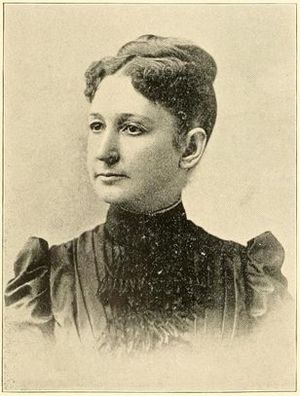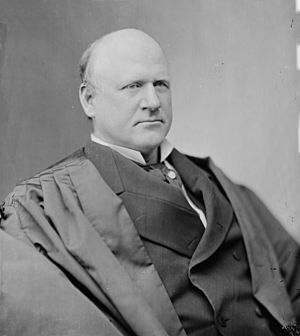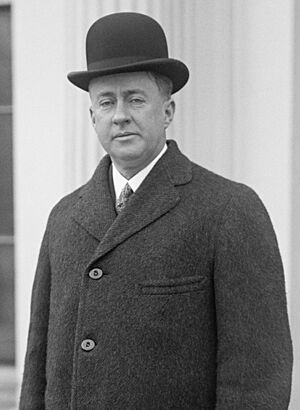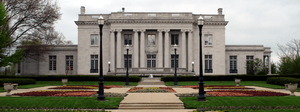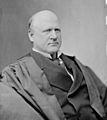James B. McCreary facts for kids
Quick facts for kids
James B. McCreary
|
|
|---|---|
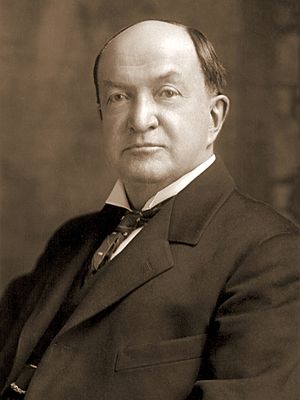
McCreary in 1914
|
|
| 27th and 37th Governor of Kentucky | |
| In office December 12, 1911 – December 7, 1915 |
|
| Lieutenant | Edward J. McDermott |
| Preceded by | Augustus E. Willson |
| Succeeded by | Augustus O. Stanley |
| In office August 31, 1875 – September 2, 1879 |
|
| Lieutenant | John C. Underwood |
| Preceded by | Preston H. Leslie |
| Succeeded by | Luke P. Blackburn |
| United States Senator from Kentucky |
|
| In office March 4, 1903 – March 3, 1909 |
|
| Preceded by | William J. Deboe |
| Succeeded by | William O. Bradley |
| Member of the U.S. House of Representatives from Kentucky's 8th district |
|
| In office March 4, 1885 – March 3, 1897 |
|
| Preceded by | Philip B. Thompson Jr. |
| Succeeded by | George M. Davison |
| Member of the Kentucky House of Representatives | |
| In office 1869–1875 |
|
| Personal details | |
| Born |
James Bennett McCreary
July 8, 1838 Richmond, Kentucky, U.S. |
| Died | October 8, 1918 (aged 80) Richmond, Kentucky, U.S. |
| Resting place | Richmond Cemetery |
| Political party | Democratic |
| Spouse | Catherine Hughes |
| Alma mater | Centre College Cumberland University |
| Profession | Lawyer |
| Signature | |
| Military service | |
| Allegiance | |
| Branch/service | |
| Rank | |
| Unit | |
| Battles/wars | American Civil War |
James Bennett McCreary (born July 8, 1838 – died October 8, 1918) was an American lawyer and politician from Kentucky. He served Kentucky in both the U.S. House of Representatives and the U.S. Senate. He was also the 27th and 37th governor of Kentucky.
After finishing law school, McCreary joined the Confederate army during the American Civil War. He was a major in the 11th Regiment Kentucky Volunteer Cavalry. After the war, he became a lawyer.
In 1869, he was elected to the Kentucky House of Representatives. He served there until 1875 and was chosen as the Speaker of the House twice. In 1875, the Democrats picked McCreary to run for governor. He easily won against Republican John Marshall Harlan.
During his first term as governor, McCreary focused on helping farmers. Kentucky was still recovering from an economic downturn called the Panic of 1873.
In 1884, McCreary was elected to the U.S. House. He served six terms in a row. He supported farmers and the idea of "free silver," which meant using both gold and silver for money. After trying twice, McCreary was elected to the Senate in 1902. He served one term there.
He ran for governor again in 1911 and won. During his second term, he lived in Kentucky's new governor's mansion. He was the only governor to live in both the old and new mansions. He helped pass laws allowing women to vote in school board elections and creating direct primary elections. He also supported a state public utilities commission. McCreary County was named after him during his second term.
Contents
Early Life and Military Service
James Bennett McCreary was born in Richmond, Kentucky, on July 8, 1838. His parents were Edmund R. and Sabrina McCreary. He went to local schools and then to Centre College in Danville, Kentucky, graduating in 1857.
After college, he studied law at Cumberland University in Lebanon, Tennessee. He earned his law degree in 1859 and was the top student in his class. He then started his law practice in Richmond.
When the American Civil War began, McCreary joined the Confederate army. He became a major in the 11th Kentucky Cavalry. This unit helped the Confederate Army win the Battle of Hartsville in 1862. In 1863, his unit joined John Hunt Morgan for his raid into Ohio. After his colonel was killed, McCreary took command of the unit. He was promoted to lieutenant colonel.
Most of his unit was captured by Union forces in July 1863. McCreary was taken as a prisoner of war to several prisons, including Fort Delaware. He was released in a prisoner exchange in August 1863. He then commanded a group of Kentucky and South Carolina troops until the war ended.
After the war, McCreary went back to being a lawyer. On June 12, 1867, he married Catherine "Kate" Hughes. She was the only daughter of a wealthy farmer. They had one son.
Early Political Career
McCreary's political journey began in 1869 when he was elected to the Kentucky House of Representatives. He was re-elected without anyone running against him in 1871.
During the 1871 legislative session, a big topic was whether to let the Cincinnati Southern Railway build a train track through Kentucky. McCreary strongly supported this project. He was chosen as the Speaker of the House, which helped the bill pass. The bill allowed the railway to build its tracks, which was important for connecting cities and trade.
McCreary was elected to the House again in 1873 without opposition. He was once more chosen as Speaker of the House.
First Term as Governor (1875-1879)
In 1875, McCreary was chosen by the Democrats to run for governor. He was a former Confederate soldier, like the other candidates. He won the election against Republican John Marshall Harlan.
When McCreary became governor, his wife Kate was the youngest first lady in Kentucky's history. The governor's office was moved out of the governor's mansion into a new building. This meant McCreary's family had more privacy.
Kentucky was facing economic problems after the Panic of 1873. McCreary focused on economic issues. Lawmakers lowered the legal interest rate to help people. They also lowered the property tax rate.
In 1878, lawmakers raised taxes on railroad property to match other property. The legal interest rate was lowered again to six percent, which pleased farmers. Other changes included separating Kentucky Agricultural and Mechanical College (now the University of Kentucky) from Kentucky University. A state board of health was also created.
Serving in Congress (1885-1897, 1903-1909)
After his first term as governor, McCreary went back to being a lawyer. In 1884, he was elected to the U.S. House for Kentucky's Eighth District. He served six terms in a row.
In Congress, McCreary supported Kentucky's farmers. He helped create the United States Department of Agriculture. He also worked to remove taxes on farm tools and machinery. He believed in "free silver," meaning the country should use both gold and silver for its money. He was a delegate to a meeting in Brussels, Belgium, about money in 1892.
As chairman of the House Committee on Foreign Affairs, he worked on settling land claims from past treaties. He also supported the idea of a railroad connecting Canada, the United States, and Mexico. He helped organize the first Pan-American Conference.
In 1902, McCreary was elected to the U.S. Senate. He was supported by Governor J. C. W. Beckham. As a senator, McCreary continued to advocate for free silver and for Kentucky's agricultural interests.
His Senate term ended in 1908. Governor Beckham wanted to become a senator himself. Beckham won the primary election against McCreary, so McCreary did not run for the Senate again.
Second Term as Governor (1911-1915) and Death
Even though Beckham had won against McCreary for the Senate, they became allies again by 1911. Beckham supported McCreary for governor. McCreary won the Democratic primary election.
In the general election, McCreary ran against Republican Edward C. O'Rear. Both candidates supported many progressive reforms. These included direct election of senators and creating a public utilities commission. McCreary also changed his view on alcohol, now supporting prohibition (banning alcohol). McCreary won the election.
One of McCreary's first actions as governor was to approve money for a new governor's mansion. He was part of the group that oversaw its building. The new mansion was finished in 1914. McCreary was the first governor to live in this new mansion.
During his second term, many progressive reforms were passed. Women became eligible to vote in school board elections. Direct primary elections were made mandatory. Counties could now hold elections to decide if they wanted to ban alcohol. McCreary also created new state departments for banking and highways. The Kentucky Public Service Commission was also established.
Near the end of his term, McCreary County was created and named in his honor. It was the last of Kentucky's 120 counties to be formed.
McCreary also worked for other reforms. He supported a law for workers' compensation, but it was later found to be unconstitutional. He also wanted rules for how political campaigns were funded. In education, the school year was made longer, and children had to attend school. Spending on public schools increased by 25 percent.
After his term as governor ended, McCreary continued to work as a lawyer. He died on October 8, 1918, and was buried in Richmond Cemetery.
Images for kids
 | Emma Amos |
 | Edward Mitchell Bannister |
 | Larry D. Alexander |
 | Ernie Barnes |


